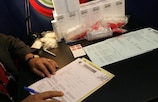Anti-doping agreement with Norway
Monday, August 15, 2016
Article summary
UEFA and European national anti-doping agencies will continue their crucial co-operation in 2016/17 – with Norway the latest country to sign a collaboration agreement with UEFA.
Article top media content

Article body
Cooperation between UEFA and European national anti-doping agencies (NADOs) means UEFA's comprehensive anti-doping drive will continue to have a key impact in 2016/17.
The Norwegian NADO (AD Norway) is the latest and 24th national agency to sign a cooperation agreement with UEFA. Under this and the other agreements, UEFA and the NADOs coordinate their anti-doping programmes and testing activities, and share information and intelligence for the planning of doping tests – thereby contributing to the building up of players' biological passports under a UEFA programme now in its second season.
Following a successful cooperation programme with the NADOs of participating countries at UEFA EURO 2016, UEFA is in a position to coordinate the doping test programme for clubs taking part in its major competitions this season – balancing its own testing plans with those undertaken by NADOs at domestic level.
"The agreement with AD Norway underlines UEFA's continued efforts to work in collaboration with European NADOs to implement the most sophisticated and deterrent testing programmes in UEFA competitions and at domestic level," said UEFA's head of anti-doping and medical Marc Vouillamoz, who signed the agreement in Trondheim with Valgerd Svarstad Haugland, chair of the board at AD Norway.
"This agreement formalises the excellent relationship with AD Norway which started many years ago," Vouillamoz added. "We are stronger if we work together against doping."
"This is a good day for anti-doping work in Norwegian and international football," said Mrs Haugland. "Sharing information and coordinating the testing will make it easier for us to protect the clean athletes."
The 2016/17 season brings further development of the steroid and blood profiling programme, introduced by UEFA last season, which helps create player biological passport profiles. The Athlete Biological Passport (ABP) has a deterrent effect as it monitors players over a period of time and indirectly reveals the effects of any doping, while providing intelligence for target testing.
UEFA has also launched a long-term sample storage programme as a doping deterrent, with samples stored from the EURO and European club competitions – enabling UEFA to reanalyse any samples when required due to intelligence received or new analytical techniques becoming available.






